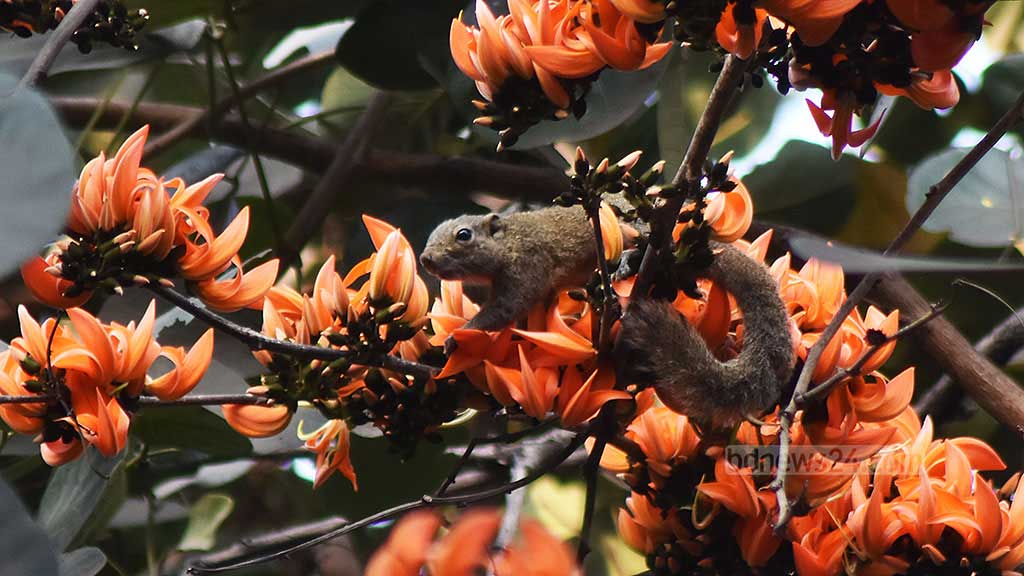Home
+
This year’s Basanta Utsab will bring vibrant celebrations to Bakultala of Charukola, the Bahadur Shah Park Memorial Stage in Old Dhaka, and the open stage at Sector 3 in Uttara

Published : 14 Feb 2025, 02:38 AM
Just days ago, trees stood bare, their fallen leaves whispering in the wind. Now, nature has adorned them with fresh green foliage.
The air is filled with the sweet fragrance of mango blossoms and the melodies of spring. Many are seen humming Rabindranath Tagore’s “Aji Basanta Jagroto Dare” or Anupam Roy’s popular track “Basanta Ese Geche”, or spring has arrived.
The arrival of spring in Bangladesh is marked by vibrant festivities, as cultural celebrations fill the air with music, dance, and the scent of fresh blossoms.
This year, the Basanta Utsab, or Spring Festival, will be held at three key locations in Dhaka: Bakultala of Charukola (Faculty of Fine Arts, Dhaka University), the memorial stage at Bahadur Shah Park in Old Dhaka, and the open stage at Sector 3 of Uttara.
A FUSION OF SPRING AND LOVE
February 14, the first day of Falgun – the spring month in the Bengali calendar – coincides with Valentine’s Day, blending the hues of love and spring into one grand celebration.
Across the Amar Ekushey Book Fair, Dhaka University’s Teacher-Student Centre, or TSC, and other parts of the city, young men and women dressed in traditional yellow and floral attire embrace the spirit of spring.

Three friends, adorned in matching yellow sarees, visited the book fair to celebrate the season. “We coordinated our outfits to mark the occasion together,” shared Sumaiya, one of them who gave a single name
Lovers, too, take to the streets, hand in hand, lost in the romance of the season. Cultural enthusiasts organise performances with music, dance, and poetry to welcome spring with open arms.
Through dance, music, rhythm, and melody, many come together to welcome spring with vibrant celebrations.
As always, Jatiya Basanta Utsab Udjapan Parishad, or the National Spring Festival Celebration Council, is leading the festivities, ensuring the vibrancy of Basanta Utsab remains unaltered across the city.
In addition to these celebrations, the cultural group Sadhana is set to stage the dance drama “Dilnawaz”, a tale of love between a prince and a courtesan, at the National Theatre Hall on Friday at 5:30pm.

Meanwhile, the Ekushey Book Fair is expected to witness a massive turnout, with publishers eagerly showcasing their latest collections for book lovers.
THE JOY OF SPRING AMIDST UNCERTAINTY
While Falgun traditionally brings joy, this year’s celebrations unfold against a backdrop of political and cultural shifts.
Since the fall of the Awami League government on Aug 5 last year, incidents like attacks on Bauls, or mystic folk singers,, the demolition of Sufi shrines, and even the banning of girls’ football matches in certain areas have raised concerns.
Yet, the spirit of youth remains unshaken. The Ekushey Book Fair is expected to draw massive crowds, and concerts and other events continue to attract thousands.
“Festivities may face challenges, but youthful enthusiasm never fades,” remarked Professor Azharul Islam Chanchal, dean of Dhaka University’s Faculty of Fine Arts. “Spring will always arrive, whether flowers bloom or not.”

THE EVOLUTION OF SPRING CELEBRATIONS
Historically, Pahela Falgun, or the first day of spring, and Valentine’s Day were observed on consecutive days. However, following the Bengali calendar reform in 2019, both are now celebrated on Feb 14.
This change aimed to align key national dates—such as Feb 21, International Mother Language Day, and Dec 16, Victory Day—with the Gregorian calendar.
Spring festivals have deep historical roots. The Mughal Emperor Akbar introduced the Fasli Calendar in 1585, incorporating 14 annual festivals, including Basanta Utsab.
In 1907, Rabindranath Tagore’s son, Shamindranath Tagore, initiated the spring festival at Santiniketan, which came to be known as “Rituranga Utsav”, or Festival of Seasons.
In independent Bangladesh, Basanta Utsab gained momentum during the anti-autocracy movement of the 1990s.
Students of Dhaka University’s Charukola Faculty first celebrated it with colourful paper flowers, butterflies, and artistic processions. By 1995 – Bengali year 1401 – it had become an officially recognised festival in Dhaka.

A CALL FOR CULTURAL HARMONY
Despite the challenges, organisers remain hopeful.
Manzar Chowdhury Sweet, general secretary of the National Spring Festival Celebration Council, acknowledges concerns over recent cultural restrictions.
“While we can celebrate in Dhaka, we hear reports of Lalon festivals being cancelled and Bauls facing persecution in other regions. These incidents worry us,” he told bdnews24.com.
He was quick to emphasise the importance of cultural diversity. “A garden does not flourish with just one kind of flower. We must let a hundred flowers bloom. Only then can we build a harmonious Bangladesh.”
As Falgun and Valentine’s Day merge into one, the city of Dhaka prepares to embrace the joy, colours, and warmth of spring’s eternal promise.
[Writing by English Desk]